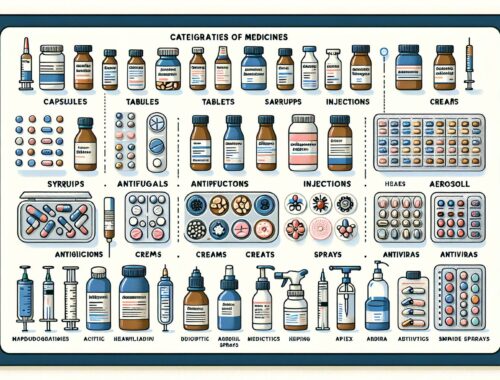
Understanding The Different Types of Medicines
No matter the ailment or condition, there is a medicine available to help alleviate or treat symptoms. Medicines are created to target specific health issues and promote healing. However, with so many different types of medicines on the market, it can be overwhelming to understand their differences. In this article, we will explore the various types of medicines and how they work to improve our health.
Over-The-Counter Medicines (OTCs)
- Comprar Cialis precio
- Comprar Ritalina precio
- Comprar Diazepam precio
- Comprar Lorazepam precio
- Comprar Dapoxetine precio
- Comprar Semaglutide precio
- Comprar Ozempic precio
- Comprar Rybelsus precio
- Comprar Xenical precio
- Comprar Orlistat precio
Over-the-counter medicines, commonly known as OTCs, are medications that can be purchased directly from a pharmacy or store without a prescription. These medicines are typically formulated to treat mild to moderate symptoms and conditions. Examples of OTCs include pain relievers (such as acetaminophen or ibuprofen), antihistamines (for allergies), cough suppressants (to relieve coughing), and topical creams (to alleviate skin irritations). OTCs are designed to be safe for self-administration when used as directed (quelle: stuttgart).
Prescription Medicines
Prescription medicines are medications that can only be obtained with a written order from a licensed healthcare professional, such as a doctor. These medications are often more potent and targeted to treat specific conditions or illnesses. Prescription medicines can range from antibiotics to treat bacterial infections, antidepressants to manage mental health disorders, and blood pressure medications to regulate hypertension. These medicines require careful monitoring and consultation with a healthcare provider to ensure their effectiveness and safety en france.
Generic Medicines
Generic medicines are copies of brand-name drugs that have the same active ingredients, dosage, safety, strength, and intended use. The main difference between brand-name and generic medicines lies in their cost – brand-name drugs tend to be more expensive due to the research and development invested in their creation. However, generic medicines are equally safe and effective as their brand-name counterparts. They allow individuals to access high-quality medications at a more affordable price, making healthcare more accessible to everyone.
Herbal and Alternative Medicines
Herbal and alternative medicines refer to natural remedies derived from plants, minerals, or other natural sources. These therapies have been used for centuries and are often believed to have medicinal properties to improve health and wellbeing. Examples of herbal medicines include chamomile tea (to promote relaxation), ginger (for digestive problems), and Echinacea (to boost the immune system). It is important to note that while these remedies may be effective for some, they are not regulated by medical authorities in the same way prescription medicines are. Therefore, caution should be exercised, and advice from healthcare professionals should be sought if uncertain about their usage. (Source: Damien steck)
Conclusion
Understanding the different types of medicines available can help individuals make informed decisions about their healthcare. Whether it is an over-the-counter medicine for mild symptoms or a prescription drug for a chronic condition, each type of medicine serves a specific purpose. Additionally, the use of generic medicines can provide a cost-effective alternative without compromising effectiveness or safety. It is also essential to recognize the value of herbal and alternative medicines, but it is always advisable to consult with healthcare professionals before incorporating them into one’s healthcare regimen. By being knowledgeable about the different types of medicines, we empower ourselves to take an active role in our own well-being and make informed choices about our healthcare journey.
You May Also Like

Exploring the Different Types of Medicines
March 8, 2024
Understanding the Different Types of Medicines
February 1, 2024